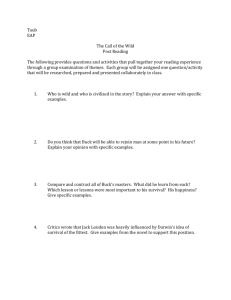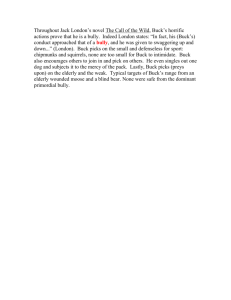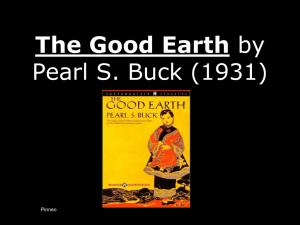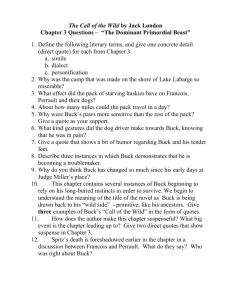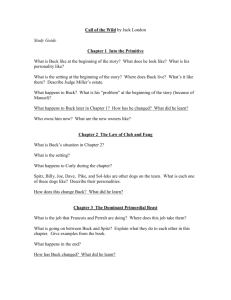IN THE SUPREME COURT FLORIDA OF
advertisement
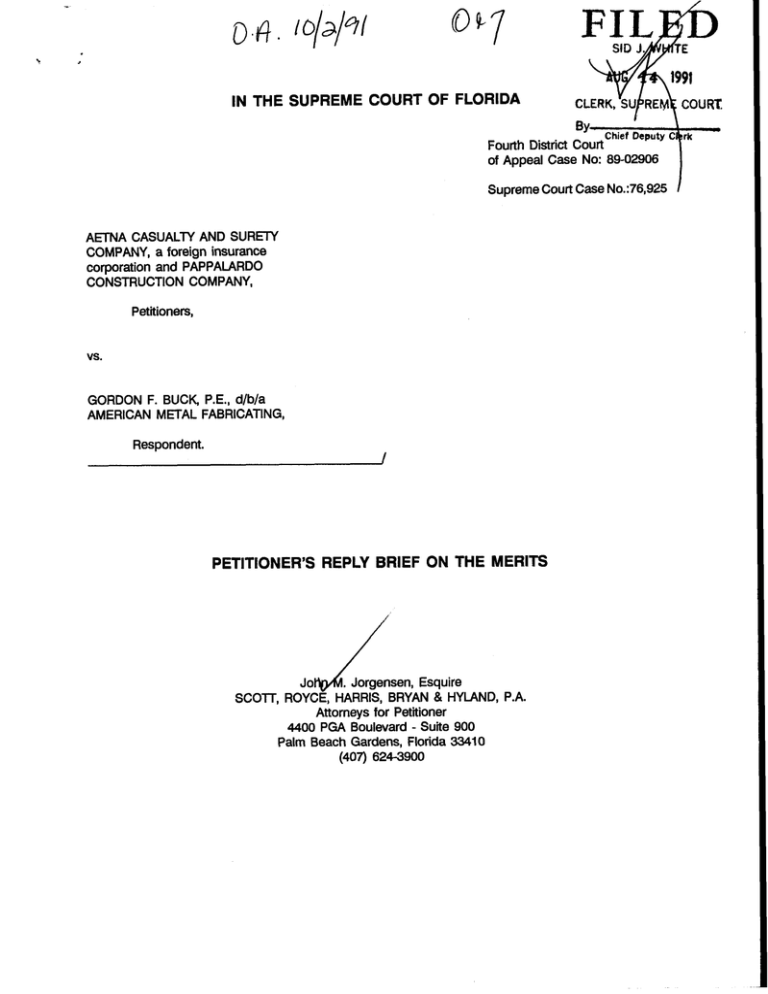
IN THE SUPREME COURT OF FLORIDA Fourth District Court of Appeal Case No: 89-02906 Supreme Court Case No.:76,925 AETNA CASUALTY AND SURETY COMPANY, a foreign insurance corporation and PAPPALARDO CONSTRUCTION COMPANY, Petitioners, vs. GORDON F. BUCK, P.E., d/b/a AMERICAN METAL FABRICATING, Respondent. PETITIONER’S REPLY BRIEF ON THE MERITS d Jo Jorgensen, Esquire SCOlT, ROYCE, HARRIS, BRYAN & HYLAND, P.A. Attorneys for Petitioner 4400 PGA Boulevard - Suite 900 Palm Beach Gardens, Florida 33410 (407) 624-3900 TABLE OF CONTENTS PAGE 1. Table of Contents i 2. Table of Authorities ii 3. Abbreviations iii 4. Argument in Response and Rebuttal 1 POINT I: THE ISSUE ON APPEAL IS WHETHER THIS COURT'S DEFINITION OF PRlVlTY SHOULD BE USED IN A COMMON OWNERSHIP CONTEXT, NOT WHETHER THERE IS EVIDENCE TO SUPPORT THE TRIAL COURT'S RULING. 1-2 THE REVISIONS TO SECTION 713.24 DO NOT MAKE A SURETY LIABLE FOR ALL REASONABLE AlTORNEYS FEES INCURRED BY A LIEN CLAIMANT IN AN ACTION ON A SURETY BOND. 3-4 POINT II: 5. Certificate of Service 5 i STATUTES Section 713 2 Section 713.24 3, 4 Section 713.29 3 ii ABBREVIATIONS The Defendant and Appellant below, Pappalardo Construction Company, will be referred to as 'PAPPALARDO'. The Petitioner, Aetna Casualty and Surety Company, will be referred to as 'AETNA'. The Plaintiff and Appellee below, Gordon F. Buck, P.E., d/b/a American Metal Fabricating, will be referred to as 'BUCK'. The owner of the property in question, Bay Colony Land Company, and First American Juno Beach Corporation, a joint venture d/b/a Bay Colony, will be referred to as the 'JOINT VENTURE'. Record is abbreviated as 'IT, Transcript is abbreviated as TI Petitioner's Brief on the merits is abbreviated as 'PB', and Respondent's Answer Brief on the Merits is abbreviated as 'RB'. iii ARGUMENT IN RESPONSE AND REBUTTAL TO RESPONDENT’S ANSWER BRIEF ON THE MERITS POINT I: THE ISSUE ON APPEAL I S WHETHER THIS COURTS DEFINITION OF PRIVITY SHOULD BE USED IN A COMMON OWNERSHIP CONTEXT, NOT WHETHER THERE IS EVIDENCE TO SUPPORT THE TRIAL COURT’S RULING. Respondent, BUCK, in his Answer Brief on the Merits has framed his argument as follows: There is substantial competent evidence in the record to support the trial court’s finding that there was privii between the property owner and BUCK, thereby excusing BUCK‘S failure to serve a notice to the owner. Neither “A or PAPPALARDO dispute that there was substantial competent evidence in the record to support the trial court’s finding of privii between the JOINT VENTURE and BUCK when the Fourth District’s definition of priv-ty is used. Indeed, pursuant to Broward Atlantic Plumbina Co. v. R. L. P., Inc. 402 So.2nd 464 (Fla 4th DCA 1981) the trial court had no choice but to find privii under the facts proven at trial. However, it is incorrect to state that the first issue before this Court is whether there is substantial competent evidence in the trial record to support the trial court’s ruling. The correct issue is what definition of privily should apply where common ownership between the owner and general contractor exists. The issue is not whether there is evidence to support a finding of privily as defined by the Fourth District. BUCK‘S rehash of the facts below and his arguments that the Fourth District’s standard for privii in a common ownership context has been met serve no purpose. They do not aid this Court in resolving the conflict between the Second District and the Fourth District. BUCK also complains in his Answer Brief on the Merits that this court should not engage in ‘schizophrenic compartmentalization’ by recognizing the distinctions between the JOINT VENTURE owner, and the general contractor PAPPALARDO. (AB., 1,2). To do so would, in Buck’s words, ’...permit the defaulting party to stiff BUCK, which stiffing would be solely supported by an elaborate fiction: that Mr. Pappalardo cannot transfer knowledge he gains in one corporate capacity to another 1 corporate capacity". (AB., 6). Again, this argument serves no useful purpose and does not provide any basis for resolving the conflict between the Second and Fourth Districts. M A and PAPPAIARDO have never denied that the JOINT VENTURE had knowledge of BUCK, or that the knowledge was obtained from PAPPAIARDO. The issue is whether both knowledge and an express or implied assumption of a contractual obligation are required for a privily finding. BUCK'S complaining about imputed knowledge, as well as his 'equitable arguments' are irrelevant. If BUCK is so convinced that he was duped or misled into not serving a Notice to Owner, he should have pursued an action to impose an equitable lien, or even an action to pierce the corporate veil. However, BUCK cannot successfully advance these fairness or equitable arguments in a mechanic's lien case, especially where he failed to serve any Notice to Owner whatsoever. If it was BUCK'S intention to file and enforce a statutory mechanic's lien, he was obligated to follow the strict Notice to Owner provisions of Chapter 713. As previously stated, this case is merely one where BUCK forgot to serve a Notice to Owner thereby losing his lien rights. It is not a case in which the Court should erode or limit the Notice to Owner requirement and override legislative intent. 2 POINT II THE REVISIONS TO SECTION 713.24 DO NOT MAKE A S U R W LIABLE FOR ALL REASONABLE ATTORNEY'S FEES INCURRED BY A LIEN CLAIMANT IN AN ACTION ON A S U R W BOND. The issue in the instant case is whether deletion of the language 'and costs not to exceed $100.00',evidences a legislative intent to make sureties responsible for all reasonable attorney's fees assessed in favor of a prevailing lien claimant on a lien transferred to surety bond. In his Answer Brief on the Merits, Buck states that if the legislature had intended to increase the recovery from $100.00 to $500.00 it could easily have said so. (AB., 17') However, there remains an expressed limitation to court costs evidenced in the statutory language which could just have easily been eliminated had the legislature intended. That occurs in the language '..plus $500.00 to apply on any court costs which may be taxed in any precedingto enforce said lien'. Since attorney's fees under the lien statute are considered costs under Section 713.29, and since the legislature could have removed the words 'any costs', it is just as evident that the legislature intended to limit an award of attorney's fees against the surety to $500.00. If the $500.00 was simply to be an amount over and above the interest calculated at the legal rate, or the amount required to be furnished to the clerk of the court for costs in transferring the lien to bond, then the statutory language should have either stopped at 'plus $500.00' or limited by removing or defining the word 'any'. BUCK argues that AETNA and PAPPAIARDO's interpretationof Section 713.24 is absurd and would allow '..shrewd and unscrupulous general contractors and/or owners...to stiff the lienor.' (AB., 19) This argument might have merit if lienor's were prevented from suing the unscrupulous owners and contractors for that unscrupulous behavior. In the instant case, however, BUCK never named the principal on the bond, Vincent J. Pappalardo, or the JOINT VENTURE itself as parties to the suit. Had he done so, BUCK would have been entitled to an unsecuredjudgment for the balance of his attorney's fees against these defendants. Williams, Hatfield and Stoner v. A 8, E Desim Inc., 538 So.2d 505 (Fla. 4th DCA 1989). 3 In conclusion, a correct interpretation of the 1987 revision to Section 713.24 limits a surety’s exposure for a lien claimant’s attorney’s fees to $500.00. Had the legislature intended such a radical departure from existing law it would have inserted express language effecting the change as well as deleted the specific directive ‘plus $500.00 to apply on any court costs.’ 4 CERTIFICATE OF SERVICE I HEREBY CERTIFY that a true copy of the foregoing Petitioner's Initial Brief on the Merits has been furnished by to JOSEPH VASSALLO ESQUIRE, 3501 South Congress Avenue, Lake Worth, Florida 33461 and an original and seven (7) copies were mailed to The Supreme Court - State of Florida, Supreme Court Building, 500 South Duval Street, Tallahassee, Florida 32399-1925 by U.S. Mail this 3&day of August, 1991. SCOTT, ROYCE, HARRIS, BRYAN & HYIAND, P.A. Attorneys for Petitioner P.o. Box 32727 Palm B Gardens, Florida 33420-2727 5
